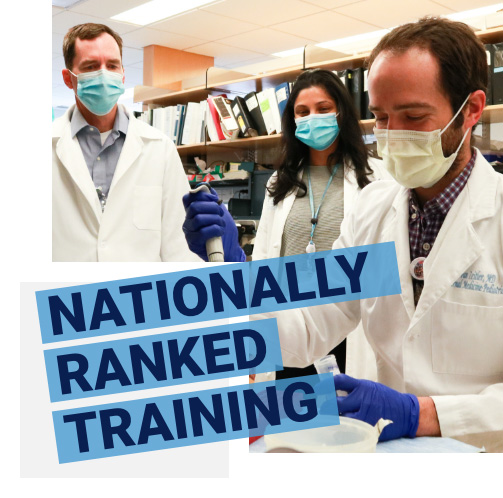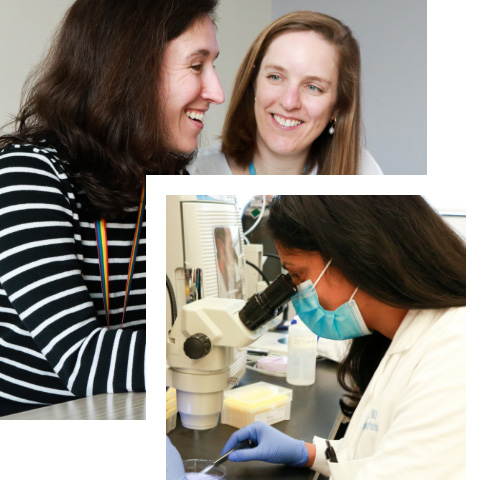Physician Scientist Training Program
This program allows candidates with significant research experience (PhD, MPH, or equivalent research background) to complete Internal Medicine residency, fellowship, and postdoctoral research training via the ABIM Research Pathway.

A Collaborative Environment at UNC
UNC provides a rich and collaborative environment to support the career development needs of physician-scientists. The UNC School of Medicine and the Department of Medicine each rank within the top 20 programs in the country for research funding. Successfully funded faculty members in every Division are eager to mentor developing physician-scientists.
UNC’s basic science departments are nationally ranked and committed to working with physicians. The Gillings School of Global Public Health at the University of North Carolina is the 2nd ranked school of public health in the nation and a rich source of mentors for Physician-Scientist scholars pursuing high-impact epidemiology research.

PSTP News
Program Overview
2 years (24 months). The Internal Medicine Residency at the University of North Carolina offers excellent clinical training, robust research opportunities and mentoring, and outstanding teaching by dedicated faculty. Our unique subspecialty training experiences expose residents to a breadth of clinical expertise while also providing substantial mentoring and research opportunities. The culture at UNC is one that fosters resident autonomy in a clinically challenging yet supportive environment. Our board pass rate is consistently 96-98%, significantly higher than the national average of 87%.
Subspecialty training and mentored research are expected to take between 4-5 years, 1-2 years of which is spent in ABIM subspecialty clinical training, and the remaining 3 years in Research. Select candidates may qualify for the program while pursuing training in general medicine.
i) Selecting a subspecialty. We anticipate most candidates will select their sub-specialty focus prior to beginning the Internal Medicine Residency. During year 1 of the program, scholars who have not selected a specialty focus meet with sub-specialty program directors and the PSTP director. Uncommitted scholars select their sub-specialty program for year 3 based on clinical and research interests, with the agreement of the specific Division Director.
Each Division within the Department of Medicine offers a fellowship program, which includes:
- Cardiology
- Endocrinology & Metabolism
- Gastroenterology and Hepatology
- General Medicine & Clinical Epidemiology
- Geriatric Medicine
- Hematology & Oncology
- Infectious Diseases
- Nephrology & Hypertension
- Pulmonary & Critical Care
- Rheumatology, Allergy & Immunology
ii) Subspecialty clinical training. We anticipate most scholars will complete the clinical requirements for their chosen subspecialty training in year 3 (or year 4 for programs that require 2 years of subspecialty training). During clinical training the scholar follows the curriculum maintained by the appropriate subspecialty program. With approval of the subspecialty program director and the PSTP director, PSTP scholars may spread their clinical requirements over years 3, 4, and 5 or shift their clinical training year into year 4 or 5, in order to accommodate specific research project needs.
Research year 1. Scholars work with the PSTP leadership committee and subspecialty fellowship director to select a research mentor prior to completion of clinical Internal Medicine residency training. The research mentor may be in a clinical or basic department, or potentially in one of the other Schools at UNC (e.g., Pharmacy, Public Health). If the mentor is outside of the Subspecialty Division, the Division Director will need to agree to the research plan.
The goal of the first research year is to provide a solid foundation of mentorship and technical training that launches the scholar’s independent academic career. Fellowship programs will be required to guarantee that 80% of the scholars’ time will be protected for research activities. Research progress and the role of the mentor will be followed closely by the PSTP committee, as the scholar-mentor lab interaction is crucial to success in the first research year.
The PSTP leadership team makes a significant commitment to our scholars, comprising regular meetings, research support, training & career development support, and direction to projects that would be expected to lead to scientific independence and launch a successful academic career. In addition to research support supplied by the mentor’s lab, scholars receive yearly research funds of up to $100,000 over 3 years of mentored research from the PSTP program. This money can be spent to hire personnel or acquire reagents, equipment, or services required for the scholar’s research. Mentors and the PSTP committee work together to identify relevant coursework (or other training opportunities) as well as early-investigator funding opportunities from which the scholars may obtain additional research funds.
Research years 2-3. The goals for this period are to complete the research and training needed for the scholars to present themselves as independent investigators to junior faculty selection committees and funding agencies. Fellowship programs guarantee 80% protected research time. By the end of year 3, scholars should be able to write a strong application for an NIH K or similar career development award from foundations. Some scholars, especially those whose fellowship research extends earlier research experience, could be ready during year 3 to apply for NIH R or similar project-level grants, which is highly encouraged.
In year 6 (or year 7 for scholars with two required years of clinical subspecialty training), the PS scholar is supported at faculty rank while continuing research in the mentors’ laboratory space and supported by the Department of Medicine. This year, scholars should apply for additional support for their research endeavors from the NIH and non-profit foundations. At the end of the program, it is hoped that the PS will be an excellent candidate for recruitment to a tenure track Assistant Professor position with bargaining power for a start-up package.

Research and Career Guidance
The Medicine PSTP program is committed to ongoing collaborative mentorship and support. In addition to the primary laboratory mentor(s), scholars have regular meetings to discuss scientific aims, career development goals, and research progress with each other and with PSTP faculty. Scholars are advised as to available competitive awards and funding opportunities and mentored in applying for these.
PSTP trainees are encouraged to take advantage of highly successful courses focused on grant writing in place at UNC. PSTP trainees applying for K-series career development grants participate in a Career Development Grant Writing Program directed by Drs. Susan Hogan and Laura Loehr. PSTP trainees with projects that are appropriate for R-series project grants are encouraged to join one of 2 available R-Writing Groups: Basic Research led by Drs. Rubin and Duncan or Population Health led by Drs DeWalt and Golin.
Benefits of the Program
- Training in Internal Medicine and subspecialty chosen by trainee through the ABIM Research Pathway
- Guaranteed salary support for protected research time of at least 80% during research years
- Faculty appointment during final year of ABIM Research Pathway training
- Up to $100,000 to support research project development during research years
- Regular meetings with PSTP leadership and colleagues covering both science, grant development
and career development